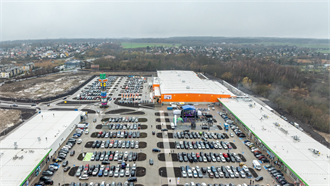The stand-out crisis performance of the UK’s biggest grocery investor, Supermarket Income REIT, has got investors checking out supermarket assets again.
But Steve Windsor, who with Ben Green founded Atrato Capital, investment adviser to Supermarket Income REIT, has a message for investors sizing up 'everyday' retailers. ‘The big picture takeaway should be that the robustness and the creditworthiness of the tenant is everything in the long-lease sector,’ he underlines.
‘The question must always be – who am I leasing to and how likely are they to pay their rent over the long term? That’s something the entire investment community is reassessing at this time.’
In a ‘situation critical’ time for retail real estate, Supermarket Income has been one of the few retail REITs to announce it would be paying its quarterly dividend after receiving 100% of its rent from tenants across its 10 supermarket assets. Windsor adds: ‘Our tenants have actually paid their rents earlier than usual, as they are trying to be supportive of their supply lines. We are fortunate to be in the right sector for this particular crisis.’
Big Four
Set up two years ago, and listed on London’s main market, Supermarket Income’s business model focuses on assets occupied by the country’s top four supermarket chains by market share, acquiring spacious, well-located sites with omnichannel capability. Tesco occupies five of the trust’s assets, representing 45% of the Supermarket Income REIT portfolio, with four leased to Sainsbury’s, and one to Morrisons. (It doesn’t yet own assets occupied by Asda, the fourth in the Big Four’).
Devised by former Goldman Sachs executives, Windsor and Green, the pair represent decades of experience in supermarket sale and leaseback deals. In just two years, the trust has become the UK’s most significant grocery investor holding £525 mln (€602 mln) of assets.
With its investment-grade tenants backed by very long leases, the industry’s cheap-debt environment has put wind in the business’ sails. Add the reluctance of consumers to date to purchase groceries online, and the business seems almost crisis proof. But could all that change in a world where online shopping has started to become the new normal? Windsor doesn’t think so – particularly taking into account the uneven response of supermarkets to ecommerce demand.
Online capacity
'The current crisis has shone a light on how little online capacity there is in the UK supermarket industry,’ he notes. ‘People thought that businesses like (online grocery service) Ocado would do incredibly well, but the reality is it was already operating at close to full capacity, and has only been able to focus on servicing existing customers – and even those not terribly efficiently.’
He adds: ‘The big four in-store pick models are actually more flexible – you can simply add more in-store picking staff to meet temporary demand.’ However, as Supermarket Income’s business model already focuses on sites with omnichannel capacity, this is doubly positive for the business. ‘It’s some of the best real estate you can own right now,’ he says.
According to data from Kantar, UK online grocery sales for the last quarter edged 13%, nearly double usual figures. ‘Supermarket sales in the UK grew at the fastest rate in over a decade. Some 90% of that has been bought in-store,’ Windsor underlines. ‘Who has benefitted from that? Physical grocers with big stores.’
Perhaps unsurprisingly, Windsor affirms that Supermarket Income is ‘one of the few REITs trading above pre-crisis share prices, along with medical surgery REITs. That means a strong balance sheet, good support from our shareholders and the opportunity to hopefully pick up some assets in future months, especially from struggling property owners.’


































